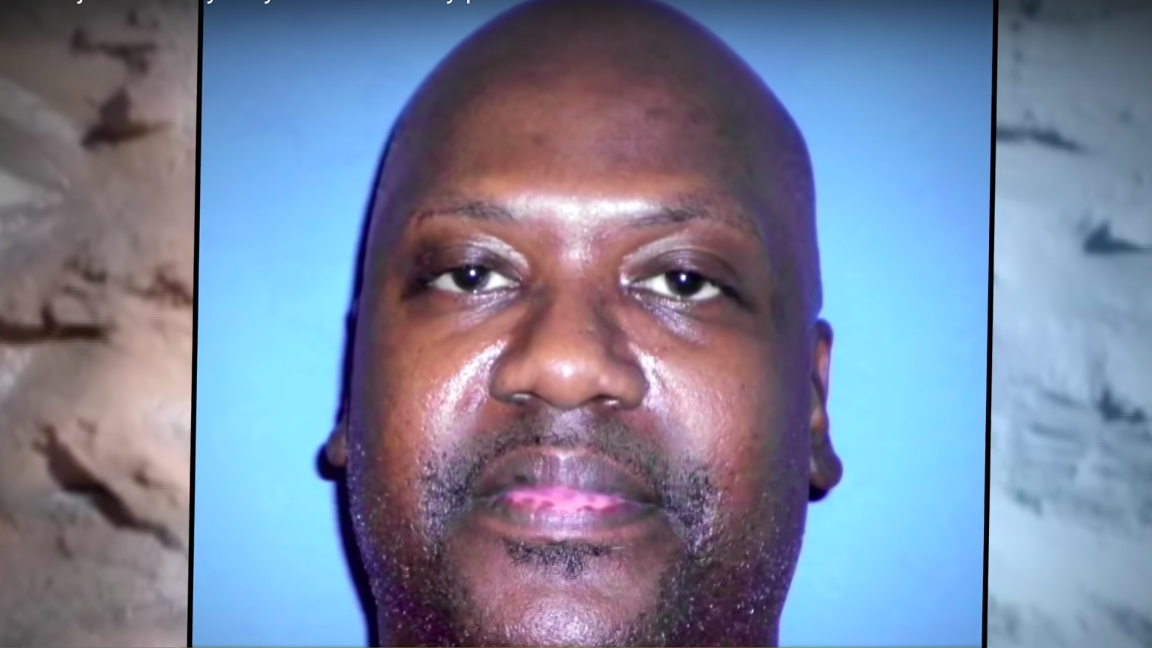Update (December 19, 2019): After spending over two decades in prison, Curtis Flowers posted bail on Monday, reports CNN.
The decision to allow Flowers to post bail comes after the U.S. Supreme Court ruled that Flowers was subject to discrimination by District Attorney Doug Evans when he turned away almost every possible Black juror for his trial.
Judge Joseph Loper set Flowers’ bail at $250,000 despite defense attorneys requesting a bail of no more than $25,000. Prosecutors requested bail be denied. According to the Mississippi Center for Justice, which is helping represent Flowers, the former death row inmate posted bail hours later.
According to CBS, an anonymous donor paid $25,000 towards Flowers’ bail.
The 49-year-old will have to wear an electronic monitoring bracelet while he waits to hear if there will be a seventh trial.
“I knew it would. I didn’t know when, but I always knew it would,” Flowers said when asked by a CBS reporter if he thought this day would ever come. “It’s been rough. [I’ve] been taking it one day at a time.”
During arguments on Monday, Defense Attorney Rob McDuff cited prosecutorial misconduct and accused Evans’ office of a “pattern of favors” in obtaining testimony against Flowers.
McDuff also stated key witnesses have recanted their statements, playing a portion of a podcast episode in which the witnesses were guests on.
"He ain't never tell me that. That was a lie. … Everything was all make-believe on my part,” one witness said in the podcast, referring to when Flowers allegedly admitted to the murders.
The defense attorney also noted that Flowers did not have a previous record and has had a clean record while in prison. He stated there is evidence pointing to three other, more likely suspects.
Assistant District Attorney Adam Hopper told the judge they still believe they have a strong case against Flowers, stating there is other evidence.
Flowers’ attorney has filed a motion to have the case dismissed, instead of facing a seventh trial, reports NBC.
“This has been a long and costly process, and there is no need to continue wasting taxpayer money on this misguided prosecution that has been plagued by misconduct and racial discrimination," McDuff said.
Original story (June 21, 2019): Curtis Flowers, who has been on Mississippi’s death row for the past 20 years, is getting another chance after the Supreme Court ruled in his favor, citing he faced discrimination and racial bias from a prosecutor.
Court justices determined on Friday in a 7-2 vote that Flowers was subject to discrimination at the hands of district attorney Doug Evans more than two decades ago, when he turned away 41 of 42 possible Black jurors in Flowers’ case, reported USA Today.
In 1986’s Supreme Court decision for Batson v. Kentucky, a justice concluded that trial judges can evaluate discrimination claims and race-neutral explanations by prosecutors.
Flowers has been tried six times for the 1996 murders of four furniture store employees in Winona, Mississippi, and Evans has been the prosecutor for each trial. Since Flowers began serving time 22 years ago, he has received three guilty verdicts, which were later reversed due to prosecutorial misconduct, and he faced two mistrials.
"That Mr. Flowers has already endured six trials and more than two decades on death row is a travesty," Flowers’ attorney, Sheri Lynn Johnson said.
The highest court in the U.S. was tasked with whether Flowers’ 2010 case should be thrown out due to Evans’ tactical discrimination in jury selection.
“The numbers speak loudly. Over the course of the first four trials, there were 36 black prospective jurors against whom the State could have exercised a peremptory strike. The State tried to strike all 36,” Justice Brett Kavanaugh said, according to NPR. Kavanaugh voted in favor of Flowers.
Conversely, Justice Clarence Thomas said there was no evidence shown proving that Flowers was a victim to any discrimination.
“If the Court's opinion today has a redeeming quality, it is this: The State is perfectly free to convict Curtis Flowers again. Otherwise, the opinion distorts our legal standards, ignores the record, and reflects utter disrespect for the careful analysis of the Mississippi courts.”
With the Supreme Court’s ruling, the state of Mississippi has the final say-so as to whether to try Flowers for the seventh time. Nevertheless, his attorney is hoping otherwise.
“We hope that the state of Mississippi will finally disavow Doug Evans’ misconduct, decline to pursue yet another trial, and set Mr. Flowers free.”

